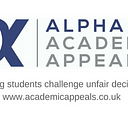GCSE & A-Level results 2021: large numbers of appeals expected from disappointed students and parents
With high stakes, broader grounds of appeal, and excellent success rates last year, a record number of students and parents are expected to appeal their results.
With only days until results are out, students and parents anxiously await their A-level and GCSE grades. For many, they are the culmination of hard work during the covid pandemic and hold the key to good universities and well-paid jobs in an uncertain employment market. Like last year, teachers rather than external examiners will have determined the grades.
Although spared from the algorithmic chaos of 2020, many students worry that teachers, counselled against the risk of grade inflation and overwhelmed with instructions from various organisations, will have erred on the side of caution when determining grades.
With broader grounds of appeal available to students, we expect a deluge of appeals this year. This would follow a sharp increase of appeals in the past couple of years.
In 2020, there were 2,215 GCSE appeals, of which an incredible 85% were upheld. In 2019, there were only 745 complaints, with 57% upheld.
For A-Levels, there were 1,040 appeals in 2020, with 77% upheld. This was a marked growth on the previous year, when only 480 appeals were received and 52% were successful.
The upward trend is likely to continue in 2021, primarily because the grounds of appeal at stage 2 — that is, the appeal to the exam board — are broader than they were last year, giving more scope for challenge.
In particular, students can appeal on the grounds of academic judgement. They can argue that the school acted unreasonably in selecting the evidence they used to determine the grade and in the determination of the grade itself based on the evidence.
Students can lodge an appeal irrespective of the school’s view as to its merits or otherwise. There is no filter.
Despite its breadth, the guidance of the Joint Council for Qualifications (JCQ) has set a high bar for this ground of appeal, perhaps to dissuade too many students from appealing. We doubt it will. To succeed, the student’s grade must be “clearly and unequivocally wrong” and such that no teacher acting reasonably would have awarded the grade.
This means that it will not be enough to show that a grade was harsh. The appellant must show that it was plainly wrong.
So, what can the student do to prepare for their appeals in advance of results day?
Although schools are not permitted to reveal the grades before the 10th August for A-levels and 12th August for GCSEs, students can ask them for the evidence used to determine their grade, the centre policy and any other supporting documentation. Schools must provide this information on or after results day at the student’s request, but we advise seeking it now, especially as the deadlines for appeals are tight and getting through to the schools on and after results day may be challenging.
Once received, the student can analyse the evidence, explore potential grounds of appeal, and be one step ahead of the others on results day.
If applied correctly, the ‘academic judgement’ ground of appeal should rarely succeed. It is worded in such a way that only clear-cut cases of unreasonable judgement should cross the high threshold. Yet, little is known about the people who will be dealing with the thousands of appeals that are expected to be lodged, including their training and background. They are unlikely to be lawyers, who are familiar with the notions of reasonableness and professional negligence. They may interpret the guidance more loosely than lawyers.
Last year, students had nothing to lose from an appeal. The grade awarded was ‘protected’, in that it could never be lowered. This has been abandoned this year, making it all the more important for students and parents to assess the merits of any potential appeal as accurately as possible before lodging it. The exercise of weighing the pros and cons of appealing is more delicate.
Bradley Talbot and Daniel Sokol PhD are specialist advisers at Alpha Academic Appeals. They have produced a video tutorial for prospective GCSE/A-level appellants: https://alpha-academic-appeals.teachable.com/courses/the-no-nonsense-guide-to-your-a-level-and-gcse-appeal-summer-2021/
